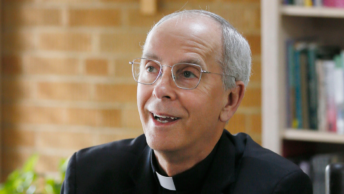
Now it begins. The fall semester is upon us. School is in full swing, fall sports are up and running, and we are beginning to get back into work mode. Although there are about 2 more weeks left in summer, after Labor Day we think of the season of autumn. The days are getting shorter, the nights longer, and the temperatures cooler.
In the Church’s liturgy, we return again to the Gospel of Mark and we hear more of Jesus’ ministry to the sick and suffering. Just as we are getting back to work in our studies and autumnal activities, the scriptures remind us that we can never shirk our responsibilities as Christians. Like the Lord, we need to be attentive to those who are marginalized. We share in Jesus’ work of opening the eyes of the blind and the ears of the deaf. We are invited to bring back into community those who are “on the sidelines” because of fear or the inability to speak. We are moved to pity for those who are suffering.
It is easy to forget the needs of others when we are busy ourselves. It is easy to ignore the plight of the poor and suffering when we are in the midst of doing our jobs or schoolwork. But as the Gospels remind us, ministry does not take a vacation. We cannot pick and choose whom we will serve without being judged by God. As the letter from St. James notes, “show no partiality as you adhere to the faith.” We may be tempted to pay more attention to those whom we like and ignore those who get under our skin; however, doesn’t that fly in the face of what being a Christian is?
Our ministry is to serve those who are in most need of God’s presence. Those who are alienated and marginalized need to be brought back into communion and relationship. The ephphatha that Jesus says to the deaf and mute man was an invitation to communion. Jesus takes the man out of alienation and restores him back to the community. He allows the man to re-establish relationships with his friends and family.
That is what ministry is all about: building up communion; that is, community with others. When someone is hungry or thirsty or imprisoned or sick or poor, they are out of communion; they are on the fringes. By reaching out to them, we help to restore them back to a relationship with God and with others. We release them from marginalization and invite them back into the community. However, they also need to cooperate with this new-found communion. In other words, they need to make a conscious response and acknowledge that they are now a part of society. When the deaf and mute man was brought back into society, he became a witness of God’s mercy. When we have been released from our alienation and are re-incorporated into society, we are invited to also be witnesses of God’s mercy and friendship.
As we get back into the swing of things whether at school or work or church, let us not forget that our ministry to one another continues. In fact, as our lives get busier, we need to make a conscious effort to engage in ministerial activities. May each of be instruments of communion, inviting those on the fringes to experience the mercy and love of God.








